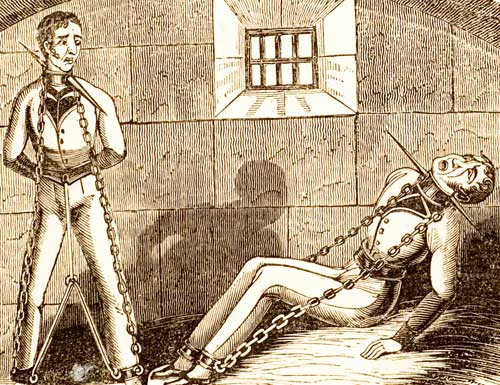The Sudds and Thompson case
In the early colony of New South Wales there was much discontent amongst the military. Many soldiers and their officers felt that wealthy ex-convicts were favoured by the Government and they were allowed freedoms far above their proper stations.
The case of Privates Joseph Sudds and Patrick Thompson appears in the personal and official papers of the colony between 1826 and 1835. The case embroiled the Governor, the Chief Justice and the Press. The controversy focussed on the role of the military-style government in an increasingly 'free' society.

Detail from Reply in refutation of the pamphlets of Lieut.-Gen. R. Darling… by Edw. Smith Hall
Bound volume DSM 991/R
Sudds and Thompson, unhappy with their soldier lives, committed a crime in order to escape their military service. They were convicted of theft and sentenced to seven years' transportation to a secondary penal colony, but Governor Ralph Darling was determined to make an example of the men and increased the punishment to seven years' hard labour. By making the spectacle of their punishment so severe, Sudds, who was already ill, weakened and died.
> Find out more about the crime and punishment of Sudds and Thompson
The cruel punishment meted out to Sudds and Thompson was harshly judged by the Press. Newspaper owners such as William Wentworth used the media to accuse the Governor of torture and abuse of authority.
> Discover more about the press reaction to the Sudds and Thompson case
Chief Justice Sir Francis Forbes was also of the opinion that Governor Darling had acted contrary to the law in punishing the men so severely.
> Read Forbes’ opinion of the punishment in his correspondence
Despite the public censure of Governor Darling, he survived the scandal with his reputation intact.
> Learn more of Governor Darling’s role in the Sudds and Thompson case





